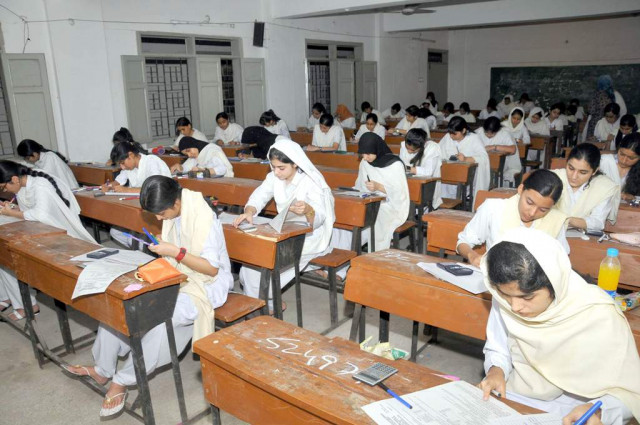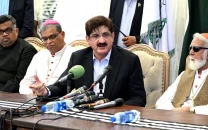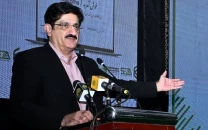Comment: Finding a way out of the cheating conundrum
The problem has worsened with time despite the launch of multiple campaigns to curb the menace

PHOTO: EXPRESS
The vice, however, has become more rampant since the early 1990s, when the issue of rural-urban divide was rife in the province. Certain political factions, back then, used the loopholes in the system to their advantage and encouraged cheating in examinations. In order to gain an upper hand on their rivals, they abetted persons affiliated with their groups in cheating during examinations so that they may later get appointed on government posts, which would work towards increasing their influence among the provincial bureaucratic circles.
Since then, the problem has only worsened with time despite the launch of multiple campaigns in the past to curb the menace. These campaigns, built on frail foundations, mainly failed due to the complete lack of an implementable plan and participation by all relevant stakeholders.
Causes
Nevertheless, there are still a plethora of other reasons contributing towards the persistence of cheating in examinations. Some of these can be identified as poor teaching standards and practices, low-quality curricula and textbooks, reliance on rote learning, increasing social pressure to get admission in renowned and professional colleges and universities and summative assessment - where students' progress is evaluated at the end of a semester instead of monitoring their performance on a regular basis.
The vicious circle
But the above-mentioned factors alone do not outline the root cause of the problem. In fact, over time, a system, including the involvement of virtually all segments of society and that facilitates cheating, has evolved. Parents, students, teachers, heads of educational institutions, education officers, the staff of the examination board and even lower staff of schools and colleges are a part of this vicious circle, which is characterised by immoral practices of using political influence and administrative powers for cheating during examinations and the like.
Study: People who cheated in school tolerate unethical behaviours at work
Besides, there is a mafia that leaks examination papers and sells these off prior to the examination.
And then, there are schools that guarantee high scores for the students - though not through hard work. The institutions pay money to secure top positions for their students. Some even charge exorbitant fees from the students, a part of which they spend to pay officials at examination centres for assisting their students with cheating.
What adds to the problem is the concentration of powers into a few hands, with just a small fraction of teachers being selected to control and conduct the examination and assessment of papers, on the pretext of 'ensuring the smooth running of the examination process.'
Firmly entrenched
Cheating is now firmly implanted in Sindh's education system and it may be extremely difficult to uproot it, but not impossible. However, it will require collective efforts from all segments of the society and multiple measures, executed on multiple levels.
Putting an end to the menace of cheating necessitates the participation of political representatives and workers in the decision-making process pertaining to conducting examination, to ensure the involvement of all sections of the society in bringing about the change. It also requires the assistance of the district and town administrations to ensure that no illegal practices take place at examination centres.
In addition, the problem cannot be eradicated until the provincial government extends administrative support and musters the courage to make bold decisions, so as to stay resilient in the face of resistance put up by those who benefit from the prevalence of cheating.
Moreover, examination boards need to back their staff responsible for conducting examinations, particularly at times when smooth running of examinations is challenged.
Technology too can play a significant role in curbing cheating. It would, by and large, be a one-time investment, the results of which could be reaped for a long time.
Installation of CCTV cameras in examination halls, for not only recording purposes but also live streaming the examination session, is one way the technology can be used to rid the society of the menace of cheating. Access to view live video streams may then be given to all relevant bodies, including the media, so as to ensure credibility and transparency. Installation of cameras will also work to discourage students to cheat out of fear of being caught red-handed and infamy.
Relevant authorities also need to consider the option of installing jammers to prevent the transfer of information via smartphones during examinations and introducing e-marking can significantly improve efficiency and transparency when checking papers. Moreover, attempting papers on computers instead of writing the examination will prevent the risk of examination papers from getting leaked. Further enhancement can be brought about by decreasing the number and increasing the size of examination centres. This will make it easier to manage these and reduce expenditure. A fewer number of examination centres means less staff and reduced expenditure, while the measure will also make invigilation easier during examinations.
Ideally, an examination centre should be able to accommodate between 1,000 and 5,000 students - in two shifts. Shifting to bigger centres and examination halls from small spaces, mostly those belonging to private schools, will ensure the presence of invigilation staff at all times as opposed to the current scenario, in which the staff remains absent through the examination at most times, especially if the exam is being held at a small centre. Invigilators too need to be trained and motivated to actively engage in stopping students from cheating during examinations. Legislation pertaining to penalising for cheating during examination needs to be revisited and punishments against the offenders, including facilitators, need to be more severe.
Develop a mechanism to curb cheating during exams, orders court
Though, none of these measures can be implemented until examination boards are provided sufficient funds, which may be achieved by preparing a PC-1 separately, specifically for extending financial support to bring out examination reforms.
However, while executing the above-mentioned steps promises lasting results, these we would be to avail and the outcome may fade rapidly if we don't change ourselves as a society. We need to actively engage in developing an opinion against cheating through conferences, public awareness campaigns and messages, seminars and workshops. A dialogue against the problem needs to be initiated all relevant platforms and via all mediums, including print, electronic and social media.
Turning the blind eye to the problem will not do any good. We have to acknowledge that today, the future of our young generation is marred by cheating and only then we may be able to confront and solve the problem. And even then, it might take years to end cheating we need to stay determined to eventually rid our students of the menace.
The author is a former Vice-Chancellor of the Shaheed Benazir Bhutto University, Nawabshah, and has also served as chairperson of the Board of Intermediate and Secondary Education, Nawabshah
Published in The Express Tribune, December 19th, 2019.



















COMMENTS
Comments are moderated and generally will be posted if they are on-topic and not abusive.
For more information, please see our Comments FAQ